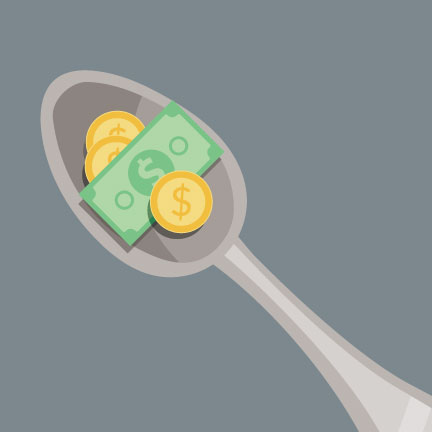
The Roth IRA Is Taking Your Medicine
Taxes, taxes, taxes. When we celebrate Independence Day each year, it’s easy to focus on the fireworks and forget that much of our dispute was over taxes. After all, wasn’t that part of the deal when we declared to the British that we wanted to see other people? That ‘taxation without representation’ thing, right? Well, in the hundreds of years that have passed since that historical moment, Americans have certainly not lost their desire to avoid unnecessary taxes. I’ll go out on a limb and assume that you’re no different than most in this regard, which is to pay no more than your fair share of tax.
Over the years, many strategies for reducing taxes have been developed, utilized, taken away, redeveloped, and labored over. And while there’s no way (or reason) to avoid all tax (I like paved roads, law enforcement, and national defense as much as the next guy), I’d like to discuss two approaches to the same tax reduction tool, the Roth IRA. The Roth IRA (‘the Roth’) has become so commonplace in discussions of financial matters that we tend to overlook it as the powerful tax-reduction powerhouse that it is, or at least can be. So let’s do a quick review of two Roth applications that may play a role in your planning.
1. If you’re still working and earning an income, you may consider contributing to a Roth IRA or your company’s Roth 401(k) or 403(b). Once you pay taxes on your income and then deposit the money into the Roth, the money can grow tax deferred and can later be withdrawn, including gains, tax-free (when certain criteria are met). The longer the money is held in the Roth and the bigger the account grows, the greater the benefit of the tax-free nature becomes. When a retiree chooses to start drawing money out to pay expenses, it’s a very lovely thing to have no taxes to pay on that money taken from the Roth. Inevitably, we hear the comment, “We should have done more of this, and a lot sooner!” Indeed.
2. People who’ve recently retired or are still under the age of 70 may benefit from a Roth conversion(s). This strategy involves converting money held inside tax deferred accounts, like a Traditional IRA, 401(k), 403(b), etc., to a Roth IRA in order to move the money into a tax-free account. Again, once certain criteria are met (like a 5-year wait period), this money can be withdrawn tax-free for the rest of your life and for the life of heirs that may inherit the account. Sounds great, right? Maybe even too good to be true? Also right. In the year that you complete the Roth conversion, you must pay taxes on the amount converted since it’s never been taxed before and is now considered ordinary income. Yikes! For a couple who may have $60,000 of room before their combined income hits the next tax bracket, they may be wise to convert that amount of money into a Roth, but they’ll now have $60,000 of added income upon which to pay taxes this year. So why would they do this? Well, at age 70-1/2, Required Minimum Distributions (RMDs) begin, requiring money to be taken out of tax deferred accounts whether you need it or not, possibly moving the retiree into a higher tax bracket. By converting money to a Roth before that age, strategically, there is often a substantial tax savings gained when viewed over the course of a decades-long lifespan. In fact, it’s not uncommon to see savings of tens or even hundreds of thousands over a normal life expectancy!
While this article is certainly not exhaustive on all the details and implications of Roth IRA funding and Roth conversions, I hope you’ll at least begin to see the power of paying the price now to benefit from substantial tax savings later. This is like suggesting you take your medicine or eating your vegetables. Both are no fun to do and require discipline, but the long-term benefits may be meaningful enough to warrant the near-term pain.
If you’d like to learn more about the potential benefits of the Roth in your planning, simply reply to this email or give us a call. This all requires you to agree to see things with a very long-term perspective, but that’s precisely what we do on your behalf; we assume you’ll live a very long time thus leveraging the power of long-term planning. On the flip side, can you imagine if we didn’t think long-term and were just sitting around waiting for something awful to happen? Yeah, you don’t want that and neither do we. We can put your medicine inside a marshmallow or cover your broccoli in butter to make it more palatable if that helps. We just want what’s best for you and it’s possible a little bit of Roth may be just what the doctor ordered.
Will you pay too much in taxes when you retire?
When you withdraw money from your 401(k) you’ll pay taxes. IRA withdrawals result in taxes. In many cases, Social Security income is taxed, pensions are taxed, bank interest, taxed. Are you setting yourself up to pay too much in taxes? Our Review Process and state-of-the-art financial planning software will not only reveal your future tax burden, but will offer options for minimizing it. Contact us today if you’d like to learn more about how to pay only your fair share of taxes during retirement.

